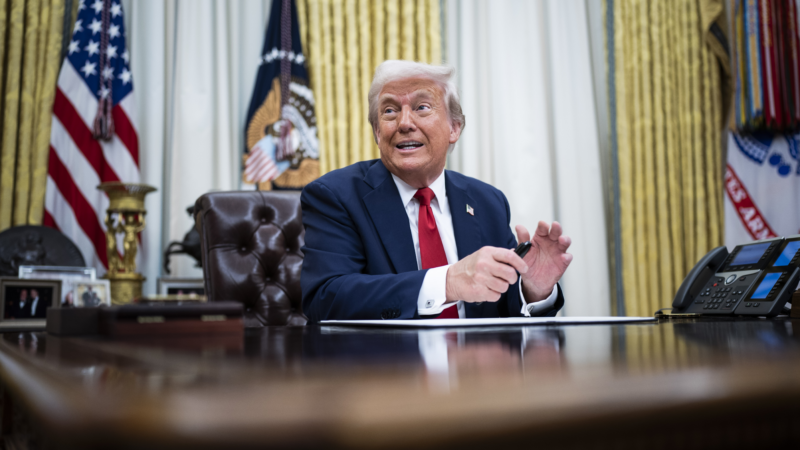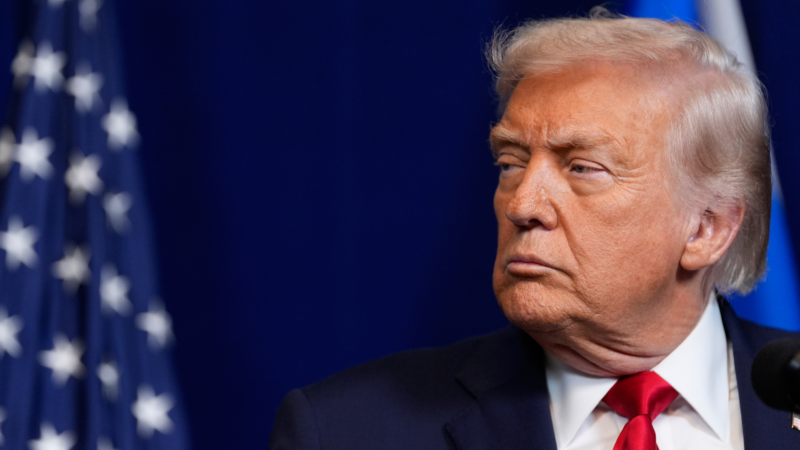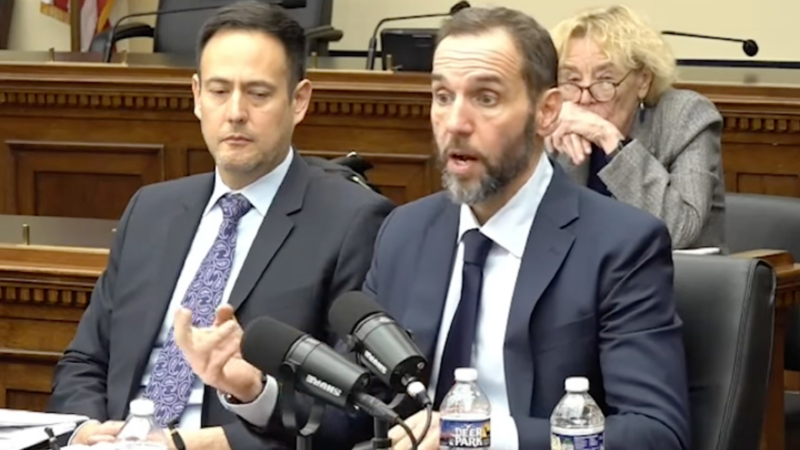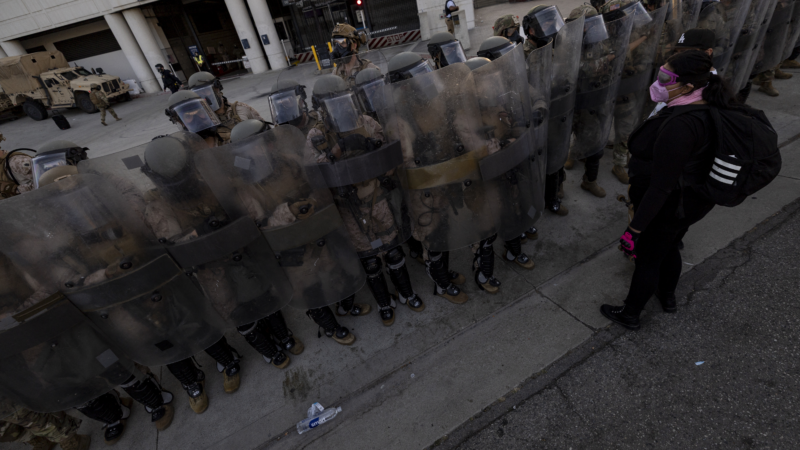Trump attacks on law firms begin to chill pro bono work on causes he doesn’t like
Since late February, President Trump has used the power of the presidency to punish law firms that he accuses of weaponizing the justice system and undermining the national interest, part of his promised campaign of vengeance against his perceived political enemies.
Trump’s use of executive orders against specific law firms is widely seen as an effort to intimidate and punish them for representing people or causes at odds with his administration. Many of the firms also were once home to lawyers who were involved in investigations of Trump himself, such as former special counsel Robert Mueller, who led the probe into Russian interference in the 2016 election.
Some law firms targeted by Trump have fought back. Others have cut a deal with him.
While the legal battle over this controversial use of presidential power is still playing out in the courts, ripple effects already are being felt beyond the boardrooms of the country’s most powerful law firms.
“I’ve never seen an administration target firms for their case selection, the clients they select. It really does set a very dangerous precedent of political interference in the legal profession,” said Lourdes Rosado, the president and general counsel of LatinoJustice PRLDEF, a New York-based civil rights nonprofit.
“The administration’s attacks on big law firms really create a climate of fear that could deter firms from taking on these very politically sensitive, yes, pro bono cases that are challenging unconstitutional actions right now.”
There’s concern over law firms curtailing pro bono work for causes that are unpopular with Trump
More than 180 lawsuits have been filed in federal court so far challenging Trump administration policies, according to a count kept by Just Security based at the New York University School of Law. Those cases have frustrated the president and slowed his agenda.
In many of those lawsuits, major law firms are working alongside advocacy groups like Rosado’s, adding resources and legal firepower. That pro bono assistance varies from case to case, but it can includes things like providing attorneys to conduct legal research or help build a case theory, or financial support to help pay for travel, experts and court costs.
NPR spoke with attorneys at a half-dozen organizations that regularly team up with big law firms that provide pro bono assistance to challenge government actions or policies. All of them say they have deep concerns that Trump’s campaign against law firms will cause firms to pull back from pro bono work that is at odds with Trump’s own views.
Some of them say it’s already happening.
“Increasingly, I’m hearing about political considerations being an issue in firms deciding whether they’re going to be able to assist,” said Dustin Rynders, the legal director of the Texas Civil Rights Project.
“I have been turned down on some recent requests where people have expressed concern about political ramifications, about being involved in immigrant rights work in this time, about being involved in civil rights, voting rights cases, in challenges against the administration,” he said.
For organizations like his, Rynders says, that pro bono work is vital.
“Without the assistance of those extra attorneys, those extra minds, those extra resources, we’re able to bring fewer cases, and we’re able to put less resources in the cases we bring, which can also impact your ultimate likelihood of success,” he said.
An attorney at another organization said that law firms they have teamed up with on a pro bono basis in the past have recently declined to work with them. The attorney, who spoke on condition of anonymity because of the sensitivity of the matter, said the firms provided no reason for their decision.
If law firms pull back on pro bono work, there likely will be fewer challenges to potentially unconstitutional actions by the government down the road. And if that happens, it’s not one case or one cause that suffers, said Jennifer Levi, the senior director of transgender and queer rights at GLAD Law.
“This isn’t just about progressive causes or any particular political stance,” Levi said. “This is ultimately about whether the legal system can function he way that it’s supposed to.”
Levi takes heart from that fact that some law firms are fighting back. Four firms targeted by Trump have sued in federal court. Judges who have reviewed the cases have already temporarily blocked enforcement of the executive orders’ punitive measures.
If the legal profession doesn’t push back now, Levi said, the whole idea of equal justice and the justice system is vulnerable.
“I don’t think that’s ultimately something that the legal profession can compromise on,” Levi said.
Transcript:
AILSA CHANG, HOST:
Since his return to office, President Trump has issued a series of executive orders against law firms that he accuses of unethical actions. It’s all part of Trump’s campaign of vengeance against his perceived political enemies. Some of the targeted law firms have fought back. Others have cut deals, and the ripple effects of this legal fight are already being felt beyond the boardrooms of Big Law. NPR justice correspondent Ryan Lucas reports.
RYAN LUCAS, BYLINE: In the Oval Office late last month, President Trump announced that the prominent law firm Skadden, Arps had reached a deal with his administration. The agreement headed off a possible executive order similar to the ones Trump has issued against other law firms. Under the agreement, Trump said Skadden would, among other things, provide $100 million in free legal work to causes supported by both the Trump administration and the firm.
(SOUNDBITE OF ARCHIVED RECORDING)
PRESIDENT DONALD TRUMP: We appreciate Skadden’s coming to the table. As you know, other law firms have likewise settled the case. And it’s a shame what’s – you know, what’s gone on.
LUCAS: What has gone on in Trump’s telling is that major law firms have weaponized the justice system and taken actions that undermine America. Part of that, he’s argued, is through the firm’s pro bono work on what he calls destructive causes, which boils down to the firms representing clients at odds with Trump’s own views on everything from the environment and civil rights to immigration and voting. Three other law firms also have struck deals with Trump to avoid punishment.
LOURDES ROSADO: I’ve never seen an administration target firms for, you know, their case selections, for the clients they select.
LUCAS: Lourdes Rosado is the president and general counsel of LatinoJustice PRLDEF, a New York-based civil rights nonprofit.
ROSADO: And it really does set a very dangerous precedent of political interference in the legal profession.
LUCAS: More than 170 lawsuits have been filed in federal court so far challenging Trump administration policies, frustrating the president and slowing his agenda. In many of those cases, major law firms are working alongside advocacy groups like Rosado’s, adding resources and legal firepower.
ROSADO: The administration’s attacks on Big Law firms really create a climate of fear that could deter firms from taking on these very politically sensitive, yes, pro bono cases that are challenging unconstitutional actions right now.
LUCAS: NPR spoke with attorneys at a half dozen organizations that regularly team up with Big Law firms providing pro bono assistance to challenge government actions or policies. All of them say they have deep concerns about law firms pulling back from pro bono work. Some say it’s already happening.
DUSTIN RYNDERS: Increasingly, I’m hearing about political considerations being an issue in firms deciding whether they’re going to be able to assist.
LUCAS: Dustin Rynders is the legal director of the Texas Civil Rights Project.
RYNDERS: But I have been turned down on some recent requests where people have expressed concern about political ramifications about being involved in immigrant rights work in this time, about being involved in civil rights, voting rights cases, in challenges against the administration.
LUCAS: The pro bono assistance law firms provide can vary from case to case, but it generally includes things like providing attorneys to conduct legal research or providing financial backing to pay for travel, experts and court costs. For many organizations, that help is vital.
RYNDERS: Without the assistance of those extra attorneys, those extra minds, those extra resources, we’re able to bring fewer cases. We’re able to put less resources in the cases we bring, which can also impact your ultimate likelihood of success.
LUCAS: In other words, if law firms pull back on pro bono work, there likely will be fewer challenges to potentially unconstitutional actions by the government down the road. If that happens, it’s not one case or one cause that suffers, says Jennifer Levi from the legal rights organization GLAD Law.
JENNIFER LEVI: Like, this isn’t just about progressive causes or any particular political stance. This is ultimately about whether the legal system can function the way that it’s supposed to.
LUCAS: Levi takes heart from the fact that some law firms are fighting back. Three firms targeted by Trump have sued in federal court. In all three lawsuits, judges have temporarily blocked enforcement of the executive orders’ punitive measures. Levi says if the legal profession doesn’t push back now, the whole idea of equal justice and the justice system is vulnerable. And that, she adds, is something the legal profession can’t compromise on.
Ryan Lucas, NPR News, Washington.
Zohran Mamdani sworn in as New York City mayor, capping historic rise
Mayor Zohran Mamdani took the oath of office in New York City after midnight Thursday. The city's first Muslim mayor, a member of the Democratic Socialists of America, has promised to focus on affordability and fairness.
Rising from the ashes, a symbol of hope at the Rose Parade
Survivors of the Eaton and Palisades Fires find healing and community working on a Rose Parade float to honor the lives and communities lost in last year's wildfires.
The history behind the NYC subway station chosen for Mamdani’s swearing-in
The city shut down the station in 1945 on New Year's Eve. Eighty years later, it's a symbolic venue choice for the incoming mayor's private swearing-in ceremony.
U.S. military strikes 5 more alleged drug boats, killing 8
The U.S. military says it struck five alleged drug-smuggling boats over two days. The attacks killed eight people, while others jumped overboard and may have survived. U.S. Southern Command did not reveal where the attacks occurred.
Capitol riot ‘does not happen’ without Trump, Jack Smith told Congress
Former special counsel Jack Smith also described President Trump as the "most culpable and most responsible person" in the criminal conspiracy to overturn the 2020 election results, according to a transcript of Smith's closed-door interview with the House Judiciary Committee.
Trump will drop push for National Guard deployments in Chicago, LA and Portland, Ore.
Courts blocked troops from deploying in Chicago and Portland, Ore., and the Los Angeles deployment effectively ended after a judge blocked it earlier this month.







